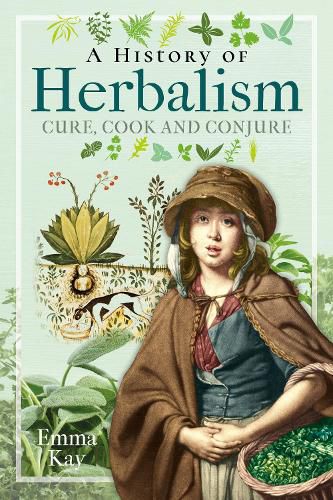Readings Newsletter
Become a Readings Member to make your shopping experience even easier.
Sign in or sign up for free!
You’re not far away from qualifying for FREE standard shipping within Australia
You’ve qualified for FREE standard shipping within Australia
The cart is loading…






Food historian Emma Kay tells the story of our centuries-old relationship with herbs. From herbalists of old to contemporary cooking, this book reveals the magical and medicinal properties of your favourite plants in colourful, compelling detail. At one time, every village in Britain had a herbalist. A History of Herbalism investigates the lives of women and men who used herbs to administer treatment and knew the benefit of each. Meet Dr Richard Shephard of Preston, who cultivated angelica on his estate in the eighteenth century for the sick and injured; or Nicholas Culpeper, a botanist who catalogued the pharmaceutical benefits of herbs for early literary society. But herbs were not only medicinal. Countless cultures and beliefs as far back as prehistoric times incorporated herbs into their practices: paganism, witchcraft, religion and even astrology. Take a walk through a medieval physick’ garden, or Early Britain, and learn the ancient rituals to fend off evil powers, protect or bewitch or even attract a lover. The wake of modern medicine saw a shift away from herbal treatments, with rituals and spells shrouded with superstition as the years wore on. The author reveals how herbs became more culinary rather than medicinal including accounts of recent trends for herbal remedies as lockdown and the pandemic leads us to focus more on our health and wellbeing. AUTHOR: Emma is a post-graduate historian and former senior museum worker. Now a food historian, author, and prolific collector of Kitchenalia, she is a member of The Guild of Food Writers. Her articles have appeared in publications including BBC History Magazine, The Daily Express, Daily Mail, Times Literary Supplement and The Victorian Review. She has featured on numerous national and international radio programmes and podcasts and contributed historic food research for several TV production companies.
$9.00 standard shipping within Australia
FREE standard shipping within Australia for orders over $100.00
Express & International shipping calculated at checkout
Food historian Emma Kay tells the story of our centuries-old relationship with herbs. From herbalists of old to contemporary cooking, this book reveals the magical and medicinal properties of your favourite plants in colourful, compelling detail. At one time, every village in Britain had a herbalist. A History of Herbalism investigates the lives of women and men who used herbs to administer treatment and knew the benefit of each. Meet Dr Richard Shephard of Preston, who cultivated angelica on his estate in the eighteenth century for the sick and injured; or Nicholas Culpeper, a botanist who catalogued the pharmaceutical benefits of herbs for early literary society. But herbs were not only medicinal. Countless cultures and beliefs as far back as prehistoric times incorporated herbs into their practices: paganism, witchcraft, religion and even astrology. Take a walk through a medieval physick’ garden, or Early Britain, and learn the ancient rituals to fend off evil powers, protect or bewitch or even attract a lover. The wake of modern medicine saw a shift away from herbal treatments, with rituals and spells shrouded with superstition as the years wore on. The author reveals how herbs became more culinary rather than medicinal including accounts of recent trends for herbal remedies as lockdown and the pandemic leads us to focus more on our health and wellbeing. AUTHOR: Emma is a post-graduate historian and former senior museum worker. Now a food historian, author, and prolific collector of Kitchenalia, she is a member of The Guild of Food Writers. Her articles have appeared in publications including BBC History Magazine, The Daily Express, Daily Mail, Times Literary Supplement and The Victorian Review. She has featured on numerous national and international radio programmes and podcasts and contributed historic food research for several TV production companies.